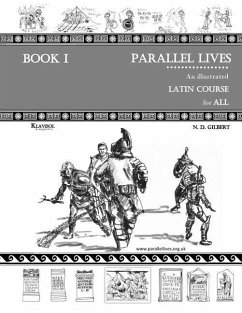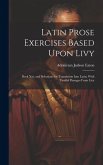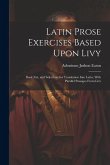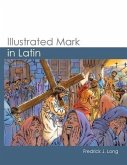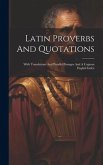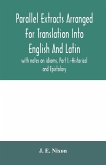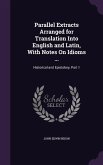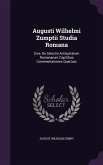'Parallel Lives' is intended to be a complete Latin course leading learners up to the equivalent of a Latin GCSE (UK) level. The textbooks are concise and the workbooks unique in Latin teaching as they are largely modelled on MFL acquisition research and practices. The workbooks are an integral part of the course as the activities in them interlace intricately with those in the textbooks and enhance the learning process.The illustrations throughout have been done professionally and are intended to illustrate the stories, to promote discovery and discussion and to encourage creativity and imagination.A designated website (www.parallellives.org.uk) provides extra support for teacher and learner alike. Audio versions of all dialogues are available for free download.The emphasis of Book I lies in two areas:1. Developing a love for the Roman World and an understanding of the ways it underpins the foundations of Western civilisation. This is done by following the adventures of young Cicero (Marcus), his best friend Titus and his sister Pomponia.Situations and themes include: at school, at home, life in town and in the countryside, Roman toys, pets, names, inscriptions, education, slavery, the Graeco-Roman Pantheon, the City of Rome, gladiators and gladiatrices, the stories of Aeneas and Odysseus etc.The title 'Parallel Lives' is suggestive of the perspective the themes are viewed from: looking for similarities and differences between characters, their lives and realities. The topics lead naturally towards parallels with the realities of the modern world (such as equality and cultural differences and tolerance).2. Language focus: most pages contain 'Language Focus' rubrics which have been kept as free of formalised grammar as possible, to allow each teacher to introduce the grammatical units in the way best suited to the learners and his or her own teaching methods.Links to English have been central: the presentation of language is based on understanding of a native English language speaker's ways of thinking and learning. E.g.: Natural gender is introduced first, emphasising links with English proper names.Standard 'case' forms are introduced through essential functions: - 'Possession and belonging' are introduced through Roman names. The logic for this primary position of the 'genitive' is its survival in English ('s / -s') which makes it the easiest to comprehend as a concept.- The 'to / for' function is introduced through gifts and dedications.- The instrumental function is introduced through situational usage in terms of everyday tools and weapons.Verbs are introduced in a seemingly formalised way, in terms of groups and personal endings, as this can make for a series of stimulating tasks within the reach of all learners. The present tense is introduced situationally and on the basis of English functions.Vocabulary acquisition is encouraged through 'For your vocabulary book' rubrics. This follows the demands of the Latin GCSE examination boards (UK). 'Help points' are dotted throughout, covering all needed running vocabulary.Prose composition is introduced in a variety of ways: direct composition modelled on examples, form creation and gap-fills, functional usage (e.g. designing and labelling of gift-tags and dedicatory inscriptions).Book I (textbook and workbook in tandem) is expected to provide enough material for one year of learning with a non-selective group of a wide ability range, based on one 50 - 55 minute period per week.Books I to III are expected to lead the students through the KS3 requirements (i.e. half-way through a GCSE). We expect to be able to provide a combined edition of these three books in the near future.
Hinweis: Dieser Artikel kann nur an eine deutsche Lieferadresse ausgeliefert werden.
Hinweis: Dieser Artikel kann nur an eine deutsche Lieferadresse ausgeliefert werden.

